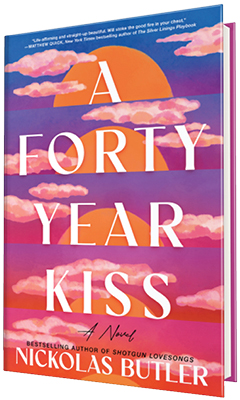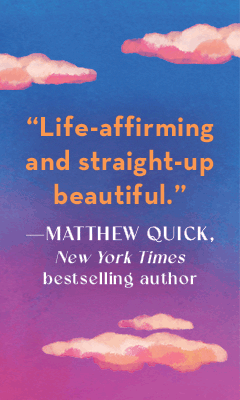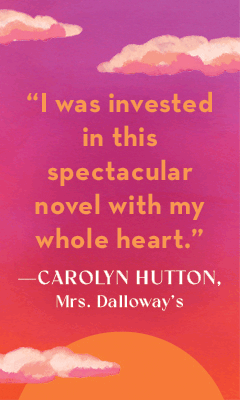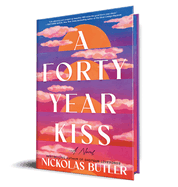A Forty Year Kiss
by Nickolas Butler
In A Forty Year Kiss, Nickolas Butler treats readers to an arresting, life-affirming novel that examines the hopes of second chance love. This passionate romance, however, is not all hugs and kisses, flowers and chocolates. This is a deeply affecting novel that brilliantly examines how life and the passage of time changes people--or does it?
A stunningly crafted opening scene set in a small-town watering hole--the Tomahawk Room in Chippewa Falls, Wis.--backbones the story. Sixty-four-year-old Charlie Fallon waits at the bar, fidgety, frightened, and anxious with "love-crazy hopes," for the arrival of Vivian Peterson, his 62-year-old ex-wife. After inheriting a house and farm nearby, the retired Charlie has moved back to his old stomping grounds from Albuquerque, N.Mex., and has been sprucing up the property bequeathed to him, a project that inspires him to take a leap and reconnect with Viv, whom he hasn't seen in 40 years.
Charlie has always loved Vivian, and for four decades she has lingered in his heart as he entered into other relationships and endured two other marriages that he admits failed through his own fault. Charlie and Viv had fallen head over heels when they were in their 20s--"kids driven by attraction. They were in love. In lust, more to the point." This led to their marriage in 1980. Yet, by 1984, the couple had divorced. After the split, Charlie got his life on track, building a successful and meaningful career working for the railroad. He also--rather inadvertently, through friends--reaped a financial windfall, investing wisely at the dawn of the Internet age. Yet in the last few years, Charlie--handsome, a smart dresser--has become haunted by Viv. "Haunt is a strong word, but that was the only word for it. Haunt. His memories of her. His regrets.... she'd never left his mind, not completely. You can't love someone the way they had loved each other and then just forget, forget everything."
Charlie's inheritance may have initiated his return to Wisconsin and his looking up Vivian, to see what had become of her life. But other factors came into play, too: his aging and retirement; his suffering with infirm family and loved ones, some of whom have died; and his witnessing friends making memories with families of their own--an aspect of life that escaped Charlie.
Viv's rationale in accepting Charlie's invitation for their reunion is simply curiosity and boredom--and not having been out on a date in a very long time. When Viv finally arrives at the Tomahawk Room to meet Charlie after four decades, she is still beautiful and upbeat. She's also nervous and emotionally armored. She is not sure how much information to disclose to this man she once loved and knew intimately.
Charlie had "frustrated her and eventually broke her heart." But after they finally divorced, she carried on with life. She became involved with a local mechanic and became pregnant with a daughter, Melissa, before they wed. The couple shared a rather staid, perfunctory marriage that endured great challenges; Viv was later widowed. Ensuing years left her to scrape by financially and share a ramshackle rental of a tiny house with her beloved daughter--now a single mom, "raising two young kids with no help from either of the fathers, and no savings or worldly possessions." While Vivian's life had become somewhat hardscrabble, her resilient, optimistic nature enabled her to appreciate that the richest rewards of her life were simple pleasures, centered on the close-knit bond shared with her nuclear family--however flawed.
From their first meeting, Charlie and Viv seem to pick up right where they left off, reminiscing about everything--their wedding, foods they used to enjoy, their regrets, their mistakes. Charlie disarms Viv by apologizing to her, outright, for the failure of their marriage. This admission leads them to share a passionate, evocative kiss. They quickly get swept up by the very best of what their romantic relationship once offered.
As the couple spends more time together, Viv falls under Charlie's spell of being impulsive, spontaneous, and fun. These qualities encourage her to trust him again. However, Viv soon learns how Charlie can still be smothering and overpowering, brooding and intense. And she makes it clear that her family is her top priority. The different ways they perceive and live life create conflict: self-sufficient and financially secure Charlie, enamored of the finer things of life, without kin, alone in the world; doting Vivian, pinching pennies and deeply enmeshed in the lives of her offspring. Butler probes how these differences challenge the dynamic of their relationship and their enduring love.
Memory comes to serve both the good and the bad. Old wounds, vices, and destructive patterns of behavior--along with invisible scars and startling secrets that have the power to reveal vulnerabilities--eventually drive a wedge between Charlie and Viv and threaten the dreamy idealism of their reclaimed romance.
As exemplified in his other books, Butler's stellar storytelling vividly maps the foibles and redemptive nature of the human condition--and how the past informs the present and the future. In A Forty Year Kiss, he presents an unforgettable fictional exploration of second chance love. Beautifully crafted dual narration, perfect pacing and surprising plotting--along with likable, multi-faceted characters--will pierce the hearts and minds of readers who will become totally invested in deeply resonant themes of true love, family, and mortality. --Kathleen Gerard








.jpg)